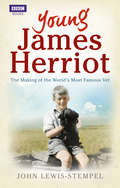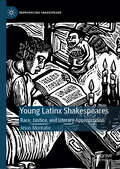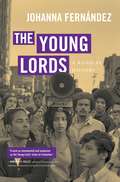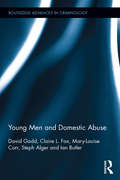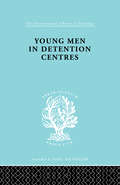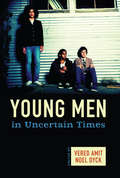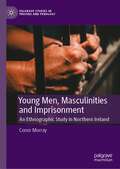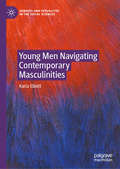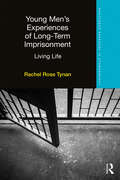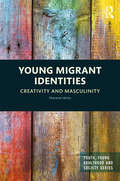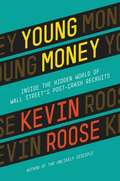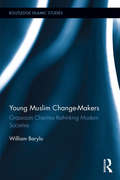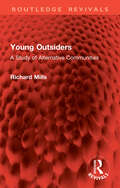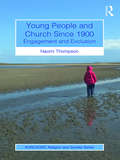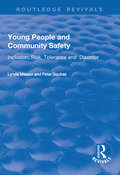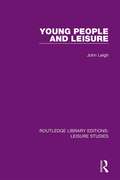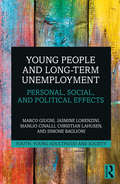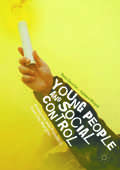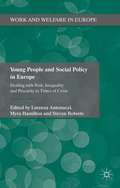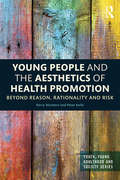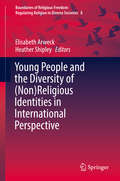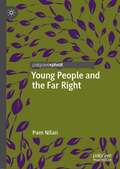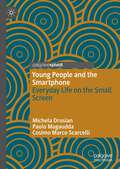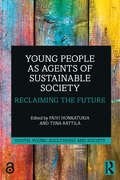- Table View
- List View
Young James Herriot: The Making of the World’s Most Famous Vet
by John Lewis-StempelSet in Glasgow in the 1930s, Young James Herriot is the fascinating story of Herriot’s formative years at veterinary college, recounting the tales behind his calling to work with animals and his early friendships. With no modern drugs, and a lot of trial-and-error, James sets about learning how to treat the local farm animals and the pets of city folk.Accompanied by a cast of eccentric professors and an ensemble of aspiring veterinarians, this book reveals a world now lost to us, showing how life in pre-war Britain changed an enthusiastic young student named Alf Wight into the man who would charm millions of readers the world over.
Young Latinx Shakespeares: Race, Justice, and Literary Appropriation (Reproducing Shakespeare)
by Jesus MontañoThis book delves into the aesthetics and processes by which Latinx writers and creatives artfully adapt and appropriate Shakespeare for young readers. Shakespeare, this book demonstrates, is reimagined with social justice in mind, yielding literary mestizadas (the critical term employed to highlight the palimpsestic nature of these admixtures). These literary mestizadas not only create representational mirrors in which Latinx young readers can better see themselves and their lived cultural experiences but also offer them the opportunity to contest the social injustices that impact them and their communities. In this, the book provides the critical framework for understanding how Latinx young adult appropriations of Shakespeare offer young readers educational ecologies in which to thoughtfully engage with issues of race, gender, and sexuality. By focusing on this productive literary interplay between Shakespeare and Latinx youth literatures, this book directs us to the generative and transformative potentials that unfold from these hybridized texts. Understanding Shakespeare and Latinx, not in their separate spheres but in the way they blend together to create new, important literary formulations embraces these brave(r) new worlds in which Latinx youth are affirmed and empowered.
The Young Lords: A Radical History
by Johanna FernándezAgainst the backdrop of America's escalating urban rebellions in the 1960s, an unexpected cohort of New York radicals unleashed a series of urban guerrilla actions against the city's racist policies and contempt for the poor. Their dramatic flair, uncompromising vision, and skillful ability to link local problems to international crises riveted the media, alarmed New York's political class, and challenged nationwide perceptions of civil rights and black power protest. The group called itself the Young Lords.
Young Men and Domestic Abuse (Routledge Advances in Criminology #18)
by David Gadd Claire L. Fox Mary-Louise Corr Steph Alger Ian ButlerSurveys reveal that domestic abuse is more commonplace among teenagers and young adults than older populations, yet surprisingly little is written about young men’s involvement in it. Reporting on a three-year study based in the UK, this book explores young men’s involvement in domestic abuse, whether as victims, perpetrators or witnesses to violent behaviors between adults. Original survey data, focus group material and in-depth biographical interviews are used to make the case for a more thoroughgoing engagement with the meanings young men come to attribute to violent behavior, include the tendency among many to configure violence within families as "fights" that call for acts of male heroism. The book also highlights the dearth of services interventions for young men prone to domestic abuse, and the challenges of developing responsive practice in this area. Each section of the book highlights further online resources that those looking to conduct research in this area or apply its insights in practice can draw upon.
Young Men Deten Centrs Ils 213 (International Library of Sociology)
by Anne B. Dunlop Sarah McCabeFirst published in 1998. Routledge is an imprint of Taylor & Francis, an informa company.
Young Men In Uncertain Times
by Noel VeredAnthropology is particularly well suited to explore the contemporary predicament in the coming of age of young men. Its grounded and comparative empiricism provides the opportunity to move beyond statistics, moral panics, or gender stereotypes in order to explore specific aspects of life course transitions, as well as the similar or divergent barriers or opportunities that young men in different parts of the world face. Yet, effective contextualization and comparison cannot be achieved by looking at male youths in isolation. This volume undertakes to contextualize male youths' circumstances and to learn about their lives, perspectives, and actions, and in turn illuminates the larger structures and processes that mediate the experiences entailed in becoming young men. The situation of male youths provides an important vantage point from which to consider broader social transformations and continuities. By paying careful attention to these contexts, we achieve a better understanding of the current influences encountered and acted upon by young people.
Young Men, Masculinities and Imprisonment: An Ethnographic Study in Northern Ireland (Palgrave Studies in Prisons and Penology)
by Conor MurrayGiven the over-involvement of young men in crime and young men’s disproportionally high rates of reoffending, it is surprising that more research has not explored young men’s experiences of prison. This book is based on the findings of a nine-month ethnographic case study of Hydebank Wood College, a young men’s prison in Northern Ireland. It seeks to explore the complexity of gender construction and masculine performance during young adulthood, while also exposing and dissecting the turbulent social life of a young men’s prison.In examining these themes, the book takes account of the unique social, economic, and political factors that impact young men in communities in Northern Ireland, paying particular attention to their feelings of powerlessness, marginalisation, and vulnerability, and the construction of identity in cultures defined by territorialism, violence, masculine stoicism, and an anti-authority code of ‘honour’. The book follows the formation of masculinities through the prison gate and considers how the penal environment contributes to the continual shaping young men’s identities. The book also adopts Gambetta’s concept of ‘signalling’ to examine how young men use different practices, such as language and embodiment, to communicate masculinity to their wider social audience. At the same time, it also considers the reluctance of young men to communicate about their sources of vulnerability.
Young Men Navigating Contemporary Masculinities (Genders and Sexualities in the Social Sciences)
by Karla ElliottThis book explores navigations of contemporary masculinities amongst young, advantaged men living in Australia and Germany. Taking an intersectional approach, the book argues that more open, egalitarian forms of masculinity, such as caring masculinities, are fostered by marginalised groups. Elliott investigates ways in which privileged men can move towards this openness alongside ongoing expressions of more traditional or regressive masculinity. Drawing on interviews, the book explores these navigations and the ways in which they are bound up with themes such as work, mobility, relationships, the privileges and pressures of masculinities, and the contradictions and difficulties of masculinities under neoliberalism. What is revealed is the need for change at individual, collective and structural levels, with care and openness amongst men as a means of achieving this change.Young Men Navigating Contemporary Masculinities will be of interest to students and scholars in fields such as sociology, gender studies, critical studies on men and masculinities, and cultural studies.
Young Men’s Experiences of Long-Term Imprisonment: Living Life (Routledge Advances in Ethnography)
by Rachel Rose TynanLong sentenced young people are a small but significant part of the juvenile prison population. The current approach to young people convicted of serious crime speaks to wider issues in criminal and social justice, including the idealisation of (some) childhoods, processes of racialisation and identity and the sociology of the body. Analysing the relationships between biography, trauma and habitus reveals the ways in which class, racial and legal status are experienced and resisted. Young Men's Experiences of Long-Term Imprisonment: Living Life considers the need for the reinvigoration of prison ethnography and calls for a phenomenological approach to understanding youth crime and punishment. An insightful ethnographic study on imprisoned 15- to 17-year-olds in England, this volume examines how young people experience long-term imprisonment, manage their time and imagine and shape their futures. Drawing on observations, interviews and correspondence, Tynan situates long-term imprisonment of young men within the wider social context of criminal and social justice; and analyses constructs and practices that locate responsibility for crime with individuals and communities. Young Men's Experiences of Long-Term Imprisonment: Living Life will be of interest to students and researchers interested in the sociology of prisons, punishment and youth justice and qualitative research methodology.
Young Migrant Identities: Creativity and Masculinity (Youth, Young Adulthood and Society)
by Sherene IdrissIn this day and age, much has been discussed as to what it means ‘to be an Arab’. However, this enlightening volume seeks instead to invite us deeper into young Arab–Australian men’s lives as we explore their vocational aspirations and working experiences within highly racialised and hierarchical industries. Young Migrant Identities is an in-depth exploration into the lives of Arab–Australian young men living in Western Sydney with creative career aspirations. Indeed, not only does Idriss explore how these men develop interests in fields such as music, filmmaking, and design, but she also examines the multilinear routes that they take to turn these interests into vocational identities. However, in the local migrant communities in which these young men live, creative identities are seen to compromise individual and familial prospects for social mobility, and artistic interests tend to go unsupported. Thus, this book also strives to offer new insights about how notions of gender, ethnicity, and social class are experienced because of these young men’s ‘risky’ career ambitions. A timely volume, Young Migrant Identities draws together a range of theoretical issues and debates, engaging with sociological approaches to race and social class, creative and cultural economies, and studies on youth. It will particularly appeal to post-graduate students and post-doctoral researchers interested in fields such as Youth Studies, Ethnicity Studies, Cultural Economy, and Migration Studies.
Young Migrants
by Katrine Fangen Thomas Johansson Nils Hammar�nThis collectionis the first to examine the life experiences of young adult immigrants in Europe, as transmitted by the young adults themselves, and together with the analytical framework, seeks to uncover mechanisms at work in these individuals' lives. "
Young Money: Inside the Hidden World of Wall Street's Post-Crash Recruits
by Kevin RooseBecoming a young Wall Street banker is like pledging the world's most lucrative and soul-crushing fraternity. Every year, thousands of eager college graduates are hired by the world's financial giants, where they're taught the secrets of making obscene amounts of money-- as well as how to dress, talk, date, drink, and schmooze like real financiers.YOUNG MONEYInside the Hidden World of Wall Street's Post-Crash RecruitsYOUNG MONEY is the inside story of this well-guarded world. Kevin Roose, New York magazine business writer and author of the critically acclaimed The Unlikely Disciple, spent more than three years shadowing eight entry-level workers at Goldman Sachs, Bank of America Merrill Lynch, and other leading investment firms. Roose chronicled their triumphs and disappointments, their million-dollar trades and runaway Excel spreadsheets, and got an unprecedented (and unauthorized) glimpse of the financial world's initiation process.Roose's young bankers are exposed to the exhausting workloads, huge bonuses, and recreational drugs that have always characterized Wall Street life. But they experience something new, too: an industry forever changed by the massive financial collapse of 2008. And as they get their Wall Street educations, they face hard questions about morality, prestige, and the value of their work.YOUNG MONEY is more than an exposé of excess; it's the story of how the financial crisis changed a generation-and remade Wall Street from the bottom up.
Young Muslim Change-Makers: Grassroots Charities Rethinking Modern Societies (Routledge Islamic Studies Series)
by William BaryloThe Muslim charity sector is stronger than ever, attracting thousands of volunteers and millions of pounds in donations. In times of mobile internet and social media, young people have set up small scale charities in urban areas, providing general social services to Muslims and non-Muslims alike. Breaking away from bureaucratic non-governmental organisations and traditional faith-based charities, these smaller local associations are an attractive alternative to young people. This book offers an exploration of the Muslim charity sector, from multi-million pound NGOs to discrete grassroots charities who are quietly giving rise to the next generation of Muslim entrepreneurs, scholars, politicians and other influencers. From studies of eleven charities across France, Poland and the UK, it investigates key questions around this young and dynamic movement. What motivates these young Muslim volunteers? What shapes the socially-engaged behaviour of young Muslims? What is the place and the role of Islam in their involvement and commitment to their causes? What social impact do these organisations have in their local area? How do they understand religion, faith, participation and citizenship? What challenges do they face and how do they overcome these? The book also examines how these grassroots are successful in helping to prevent extremism, curb Islamophobia and challenge colonialism. The analysis of these small, local and original initiatives is fundamental in understanding the role of religiosity for these younger generations who are trying to articulate their multiple identities, cultures and traditions in a modern, secular society. Rich, detailed and vivid, the book sheds new lights on a popular field of research, unveiling exclusive key information on the subject of young European Muslims.
Young Outsiders: A Study of Alternative Communities (Routledge Revivals)
by Richard Mills‘The Road of Excess leads to the Palace of Wisdom’: Blake’s line had become a slogan for the hippie generation. The dramatic differences between the hippies’ way of life and that of most of the rest of society at the time made them a puzzling and alarming phenomenon. Originally published in 1973, Richard Mills describes and interprets these differences in Young Outsiders.Based on research in the Ladbroke Grove and Piccadilly areas of London, the study explores critical issues which preoccupied young people everywhere and separated them from their parents’ generation. Told largely in the words of the young people themselves, the book describes their everyday life and the ways they were led to it, and looks at some of the central elements in their culture, particularly drugs and underground music. It is shown that the distinctive feature of their lives was the search for a special kind of intensified experience which they felt could give a greater sense of wholeness and identity than the conventional roles and routines from which they were alienated. Richard Mills examines some of the dilemmas into which this search could lead, and questions how far it provided the basis for a viable way of life. Today it can be read in its historical context.
Young People and Church Since 1900: Engagement and Exclusion (AHRC/ESRC Religion and Society Series)
by Naomi ThompsonWhen the Sunday School pioneers saw a need in their communities in the late eighteenth century, their response provoked a 200 year movement. These early Sunday Schools met a clear social need: that for basic education. By the 1960s, they faced rapid decline – a rigid institution amidst societal change. Over recent decades, Christian youth work has emerged as a response to further youth decline within churches. Many youth workers engage with young people’s self-perceived needs by delivering open-access youth provision in their local communities alongside more specifically Christian activities. Tensions emerge over whether the youth worker’s role is to serve community or church needs, with churches often emphasising the desire to see young people in services. Drawing together historical and contemporary research, Young People and Church Since 1900 identifies patterns and change in young people’s engagement with organised Christianity across time. Through this, it provides a unique analysis of the engagement and exclusion of young people in three key time periods, 1900–1910, 1955–1972, and the present day. Whilst much commentary on religious decline has focused on changes external to churches, this text draws out the internal decisions and processes that have affected the longevity of Christianity in England. This book will be of interest to researchers and scholars of young people and Christianity in the twentieth century and today, as well as youth ministry students and practitioners and those interested in youth decline in churches more widely.
Young People and Community Safety: Inclusion, Risk, Tolerance and Disorder (Routledge Revivals)
by Lynda Measor Peter SquiresThis title was first published in 2000: Effective service provisions for young people are often said to be the key to Community Safety planning yet research frequently shows young people as over-controlled yet under-protected. Taking up this dilemma, this work draws upon a large survey of young people's attitudes towards the opportunities facing them and the communities in which they live. The book explores many aspects of young people's lives that adult society finds so disconcerting or threatening or which agency service providers find so difficult to address. The results of these surveys are contrasted with surveys amongst key agency personnel - social services, education, housing, police and the youth service - developing contrasting perspectives on "young people's needs". These findings are then further contrasted with a survey of adult community reactions, revealing markedly different levels of tolerance and intolerance. Discussion of the research findings is situated within a critical review of existing youth diversion and community safety policy initiatives which, by listening to young people and resisting the "demonization" of the young, attempts to take a fresh look at the contemporary "youth question".
Young People and Leisure (Routledge Library Editions: Leisure Studies)
by John LeighFirst published in 1971. The purpose of this study is to examine the relationship which exists between the education services and the leisure time of the people they attempt to serve. The author explores education and provision for leisure and the problems of schools, youth services and adult education in relation to this. The case study of the leisure lives of young adults in a small industrial village provides some illustration of the difficulties of providing for leisure in non-urban areas. This title will be of great interest to policy-makers and to students of Sociology and Leisure Studies.
Young People and Long-Term Unemployment: Personal, Social, and Political Effects (Youth, Young Adulthood and Society)
by Marco Giugni Jasmine Lorenzini Manlio Cinalli Christian Lahusen Simone BaglioniYoung People and Long-Term Unemployment examines the consequences of long-term unemployment for the personal, social, and political lives of young adults aged 18–34 across four European cities: Cologne (Germany), Geneva (Switzerland), Lyon (France), and Turin (Italy). Adopting a multidimensional theoretical framework aiming to bring together insights based on the contextual (macro), organizational (meso), and individual (micro) levels, and combining quantitative and qualitative data and analyses, it reaches a number of important conclusions. First, our study shows that the experience of long-term unemployment has a negative impact on different dimensions of young people’s lives. When compared to employed youth, unemployed youth are less satisfied with their lives, more isolated, and less independent financially. Second, however, there are important variations across the four cities. This means that, in spite of widespread retrenchments, in some places the welfare state still acts as a buffer against unemployment. Third, although young unemployed people participate in politics equally if not slightly more than employed youth, the young unemployed are often disconnected from politics. This is so even when they have important grievances to express in the face of high youth unemployment, precarious working conditions, and grim future perspectives on the labor market. This book will be useful for scholars interested in unemployment politics and youth politics, researchers and teachers in political science, sociology, and social psychology.
Young People and Social Control
by Ross Deuchar Kalwant BhopalThis book explores young people's experiences of social control and the state, especially those living at the margins of society within the UK. In particular, the book focuses on disadvantaged young people's experiences in education, in the labour market, with police and within the criminal justice system. It draws upon insights gathered by the authors in Scotland and England via in-depth interviews with, and observation of, young people in multiple settings and the barriers they come across in terms of justice, equity and inclusion. Deuchar and Bhopal present a range of creative and engaging case studies that illustrate where barriers have been broken down between young people and the agents of social control and elucidate upon how a sense of justice and inclusion has emerged. With its wide-ranging, multi-perspective approach, this study will be essential reading for scholars and students of sociology, criminology and youth studies, as well as holding appeal for policy-makers and practitioners.
Young People and Social Policy in Europe
by Lorenza Antonucci Myra Hamilton Steven RobertsThis edited collection provides the first in-depth analysis of social policies and the risks faced by young people. The book explores the effects of both the economic crisis and austerity policies on the lives of young Europeans, examining both the precarity of youth transitions, and the function of welfare state policies.
Young People and the Aesthetics of Health Promotion: Beyond Reason, Rationality and Risk (Youth, Young Adulthood and Society)
by Kerry Montero Peter KellyHealth promotion with young people has largely been framed by theories of behaviour change to target ‘unsafe’, ‘unhealthy’ and/or ‘risky’ behaviours. These theories and models seek to encourage the development in young people of reasoned, rational and risk-aware personal strategies. This book presents an innovative and critical perspective on young people and health promotion. It explores the limits and possibilities of traditional health behaviour change models with their focus on reason, risk and rationality by examining the embodied dimensions of meaning-making in health promotion programs. Drawing on an array of critical social theories and approaches to knowledge production the authors identify and engage the aesthetic and affective dimensions of young people’s engagement with issues such as road safety, sexualities, alcohol and drug use, and physical and mental health and well-being. The book will appeal to researchers and practitioners in the fields of health promotion and health education, public health, education, the sociology of health and illness, youth studies and youth work.
Young People and the Diversity of (Boundaries of Religious Freedom: Regulating Religion in Diverse Societies #8)
by Elisabeth Arweck Heather ShipleyThis volume brings together current research on young people, (non)religion, and diversity, documenting the forms young people’s stances may take and the social or spatial contexts in which these may be formed. The social contexts studied include the family, school, and faith communities. The spatial contexts include (sub)urban and rural geographies and places of worship and pilgrimage.Youth and (non)religion are an area of academic interest that has been gaining increasing attention, especially as it pertains to youthful expressions of (non)religion and identities. As research on religion and young people spans and expands across academic disciplines and across geographic areas, comparative approaches and perspectives, such as presented in this volume, offer important spaces for reflecting about the experience of religiosity among young people and the ways they are learning about, and developing, (non)religious identities. Building bridges geographically and methodologically, this volume provides an international perspective on religion and nonreligion among young people, offering a diversity of religious and nonreligious perspectives.
Young People and the Far Right (Alternatives and Futures: Cultures, Practices, Activism and Utopias)
by Pam NilanThis book looks at how young people get attracted to the Far Right, especially young white men. We may never know why a young individual ends up there, yet two things are obvious. First, Far Right propaganda appeals to the fantasy imagination and to the emotions. Second, supporting the Far Right is a decision often made by digitally-networked 15-25 year olds looking for answers and wanting to express their anger. However, many later become aware of a yawning gulf between the ideal future they envisioned, and what happens in the here and now. Accounts of the Far Right often focus on terrorist events, plots or extreme acts of violence. However, the emphasis here is on rather ordinary young people and how they get involved in a social movement that promises adventure and belonging. The aim is to better understand how their hate practices are framed and channeled by the persuasive discourse of the Far Right.
Young People and the Smartphone: Everyday Life on the Small Screen
by Michela Drusian Paolo Magaudda Cosimo Marco ScarcelliIn recent years, smartphones and digital platforms have become essential to our lives and are now inextricably interwoven into the everyday practices of millions, especially young people. Focusing on smartphone practices and experiences of youth today, this volume is the result of empirical research based on focus groups and in-depth interviews with young people aged 18-30. Grounded in media theory and analyzed through a blended lens of media and science and technology studies, the book offers detailed and fascinating insights into the everyday use of smartphones. Topics covered include the role of the smartphone as material technology, its use in interpersonal relationships, photographic practices, music and consumer practices, along with the deconstruction of the notion of smartphone ‘addiction’.
Young People as Agents of Sustainable Society: Reclaiming the Future (Youth, Young Adulthood and Society)
by Päivi Honkatukia Tiina RättiläThis book analyses young people’s societal participation as a central dimension of their well-being and as vitally important to secure the sustainable future of humankind and the whole eco-social system. It develops a theoretical framework for analysing youth participation holistically, embedded in its everyday context, and as a relational phenomenon, underpinned by universal human needs. It introduces innovative methodological approaches to study youth engagements in society. This book will appeal to scholars and students of youth studies, sociology, sustainable development, youth participation and education. It also offers new knowledge and theoretical readings for policy experts on youth and sustainable development, as well as for NGOs working with youth. The Open Access version of this book, available at http://www.taylorfrancis.com, has been made available under a Creative Commons Attribution-Non Commercial-No Derivatives (CC-BY-NC-ND) 4.0 license.
